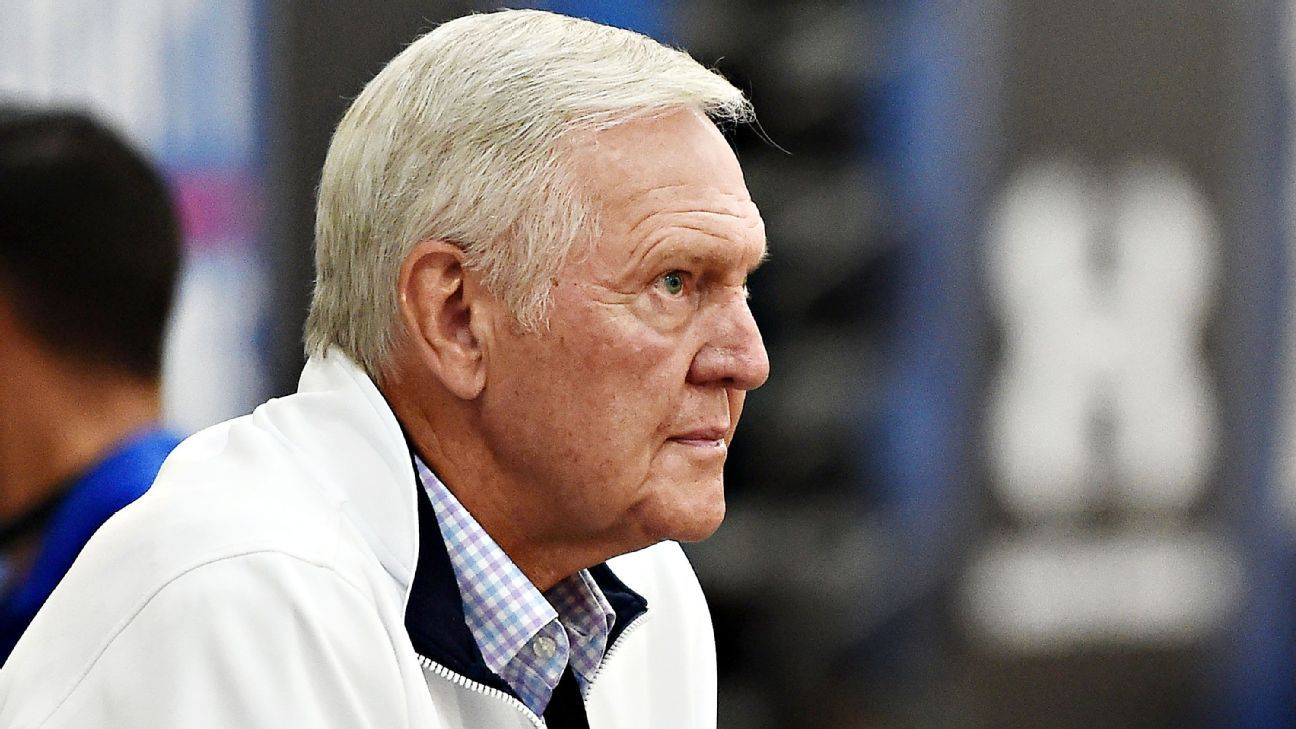
Former Los Angeles Lakers executive Jerry West demanded a retraction and an apology for what he called "a baseless and malicious assault" on his character in the HBO series "Winning Time," in a letter sent by his legal team to the network and producer Adam McKay on Tuesday evening, which was obtained by ESPN.
West's lawyers allege that "Winning Time falsely and cruelly portrays Mr. West as an out-of-control, intoxicated rage-aholic," saying that "bears no resemblance to the real man," and ask for a retraction no later than two weeks from the receipt of the letter.
"The portrayal of NBA icon and LA Lakers legend Jerry West in 'Winning Time' is fiction pretending to be fact -- a deliberately false characterization that has caused great distress to Jerry and his family," said Skip Miller, a partner at the Miller Barondess, LLP law firm in Los Angeles and attorney for West. "Contrary to the baseless portrayal in the HBO series, Jerry had nothing but love for and harmony with the Lakers organization, and in particular owner Dr. Jerry Buss, during an era in which he assembled one of the greatest teams in NBA history.
"Jerry West was an integral part of the Lakers and NBA's success. It is a travesty that HBO has knowingly demeaned him for shock value and the pursuit of ratings. As an act of common decency, HBO and the producers owe Jerry a public apology and at the very least should retract their baseless and defamatory portrayal of him."
West's lawyers say HBO's disclaimer that the series is a dramatization does not insulate the network from liability.
HBO did not immediately respond to or comment on West's letter.
The series, which has been airing Sunday nights this spring on HBO, is based on author Jeff Pearlman's book "Showtime: Magic, Kareem, Riley, and the Los Angeles Lakers Dynasty of the 1980s."
West's lawyers allege that the series creators acted with "legal malice" because many of the scenes in the series showing West's purported rage did not appear in Pearlman's book and did not happen. The letter includes statements from players like Kareem Abdul-Jabbar, Michael Cooper and Jamaal Wilkes, as well as Lakers employees such as Claire Rothman, Charlene Kenney, Bob Steiner and Mitch Kupchak who worked with West during the time period covered in the show denying that they ever saw him commit any of the rage-filled acts or drink alcohol in the office, as depicted in the series.
"Instead of exploring his issues with compassion as a way to better understand the man, they turn him into a Wile E. Coyote cartoon to be laughed at," Abdul-Jabbar said in a statement. "He never broke golf clubs, he didn't throw his trophy through the window. Sure, those actions make dramatic moments, but they reek of facile exploitation of the man rather than exploration of character."
Rothman, who ran operations at the Great Western Forum for over 20 years and is portrayed by Gabby Hoffman in the series, said, "Jerry treated me and everyone else in the Lakers organization with dignity and respect. I never saw Jerry break or throw anything in anger or rage, nor did I hear anyone ever say he did such things."
Kupchak, now the Charlotte Hornets' general manager, played for the Lakers from 1981 to '86, then worked alongside West in the front office from '86 to 2000.
"During my time with the Lakers as a player and in the front office, Jerry was always professional, even-keeled and soft spoken," Kupchak said. "He was always positive and encouraging with me. I also found Jerry to be honest and sincere. I never saw or heard Jerry lose his temper with anyone. I also never saw or heard Jerry go on an angry rant or tirade nor did I ever see or hear Jerry scream or yell at anyone. That was not his personality. Jerry is soft spoken and does not like confrontation. He always keeps his composure and remains calm even when he has a disagreement with someone. Last, I've never heard or seen Jerry ever break or throw anything in anger."
West's lawyers say he is due a retraction, an apology, and damages from HBO and the show's producers because "the show goes out of its way to denigrate Jerry West despite his accomplishments as an executive."
The letter goes on to cite the series' depiction of West's role in the drafting of Magic Johnson, saying it implies West had "personal animus" against Johnson and tried to "sabotage" his selection. West's lawyers say he only pointed out Sidney Moncrief's scoring ability and said the Lakers should consider him, while then-owner Jack Kent Cooke had the final decision.
"So instead of seeing the true Jerry West -- a brilliant GM who was the architect of one of the great NBA dynasties -- anyone who watched the show would be left with the false impression that West is incompetent, that he didn't want Magic Johnson. This is a fabrication," the letter says.
"Contrary to the show, the book leaves readers with the true impression of Jerry as a brilliant and thoughtful GM. Your extreme departure from the book shows malice in your false portrayal."















 Phone: (800) 737. 6040
Phone: (800) 737. 6040 Fax: (800) 825 5558
Fax: (800) 825 5558 Website:
Website:  Email:
Email: 






